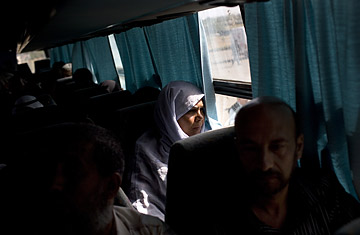
Palestinians wait inside a bus before crossing into Egypt through the Rafah border crossing, southern Gaza Strip, Saturday, May 28, 2011.
(2 of 2)
But increasingly, the revolutionaries of post-Mubarak Egypt have also focused their attention on foreign policy, particularly reform of Mubarak's steadfast but widely unpopular support for Israel and its enforcement of the Gaza blockade. Four days before the protest, the General Prosecutor's office announced that Mubarak would soon stand trial on charges of conspiring to kill protesters during the uprising. Less than a month earlier, the military had announced that it would loosen the operational procedures at Rafah crossing, easing the blockade for some 1.5 million Palestinians. While widely applauded by the Egyptian public, a number of cynics dismissed the moves as superficial efforts to mollify the would-be demonstrators of Tahrir.
At Rafah, at least thirty angry men were turned away on Saturday, deposited on buses and sent back to Gaza after their names showed up on an Egyptian security blacklist. It's a blacklist that dates to well before Mubarak's departure. "They all came today thinking they would get in because it's a new era," says a senior Egyptian border official. "But many of them have been turned away before."
"They don't like people who look like me," says Abu Mohamed, a 46-year-old Islamist, pulling on his beard. "My beard is too long," he says, retreating to a bus with other religious men who attributed their rejection to their adherence to Dawa, a strict literalist interpretation of Islam.
Jamal Najim, 53, knew that he was turned away because he was among the thousands of Palestinians who flooded into Egypt in 2007, after Palestinian gunmen literally blew a hole in Egypt's blockade. That didn't make him any less angry, and he screamed at Egyptian customs officials until he was escorted out of the terminal. In 2007, he had spent months trapped in Gaza, and was desperate to see his Egyptian wife and daughter. He was arrested in Egypt, blacklisted, and returned. He hasn't seen his family since.
Indeed, much to Palestinians' dismay — and perhaps, to Israel's comfort — Egypt's feared intelligence service, the mukhabarat, continues to wield control over the border terminal, just as it always has. Foreigners and Egyptians still require special permission from Egyptian intelligence to enter Gaza. Even Palestinians who lack Ramallah-issued IDs still face the same difficulties trying to return. The Israeli government revoked Said al-Batran's national ID card in 1981, when he left the Gaza Strip to study in Russia. "Look, I'll show you my passport," he said, flipping through the 19 Egyptian visas, each one for a failed attempt to enter Gaza, that he'd accumulated since 2006. He's trying again now because his 82-year-old mother is gravely ill. So far he has had no luck.
Most of the faces keeping security at the border haven't changed either, the Egyptian official admits. That includes Major Salama Baraka, Hamas' General Manager of Border Security, who has worked closely with his Egyptian counterparts for the past two years despite the fact that the same officials were also coordinating, at times, with the Israeli government. "We've always had good communication with the Egyptian side," he says. "But now there's the hope that travel for Palestinians will be much easier."
Indeed, it may not mark an end to the blockade, but the revised rules are a welcome change for many Palestinian families who crossed into Egypt successfully. The revolution has helped Egyptians reclaim some of the dignity they lost under Mubarak's repression, they say — and it's slowly trickling across the border to them. "It's better than before," says Issa Ali Nashar, a Hamas official from the Prime Minister's office who was traveling to Cairo for meetings and a doctor's visit. The passage has eased with the new regulations, and the Palestinians are meeting kinder treatment than they used to. "We can feel that things have changed. But we know the change will continue to come step by step."
In the arrivals terminal, Hassan, 62, was calm and optimistic, en route to Jordan for medical treatment. "It used to be that if you needed to go abroad for something, you had to really plan and gather your papers. We used to have to wait all day to cross," she says. "So far, we have only waited an hour."
